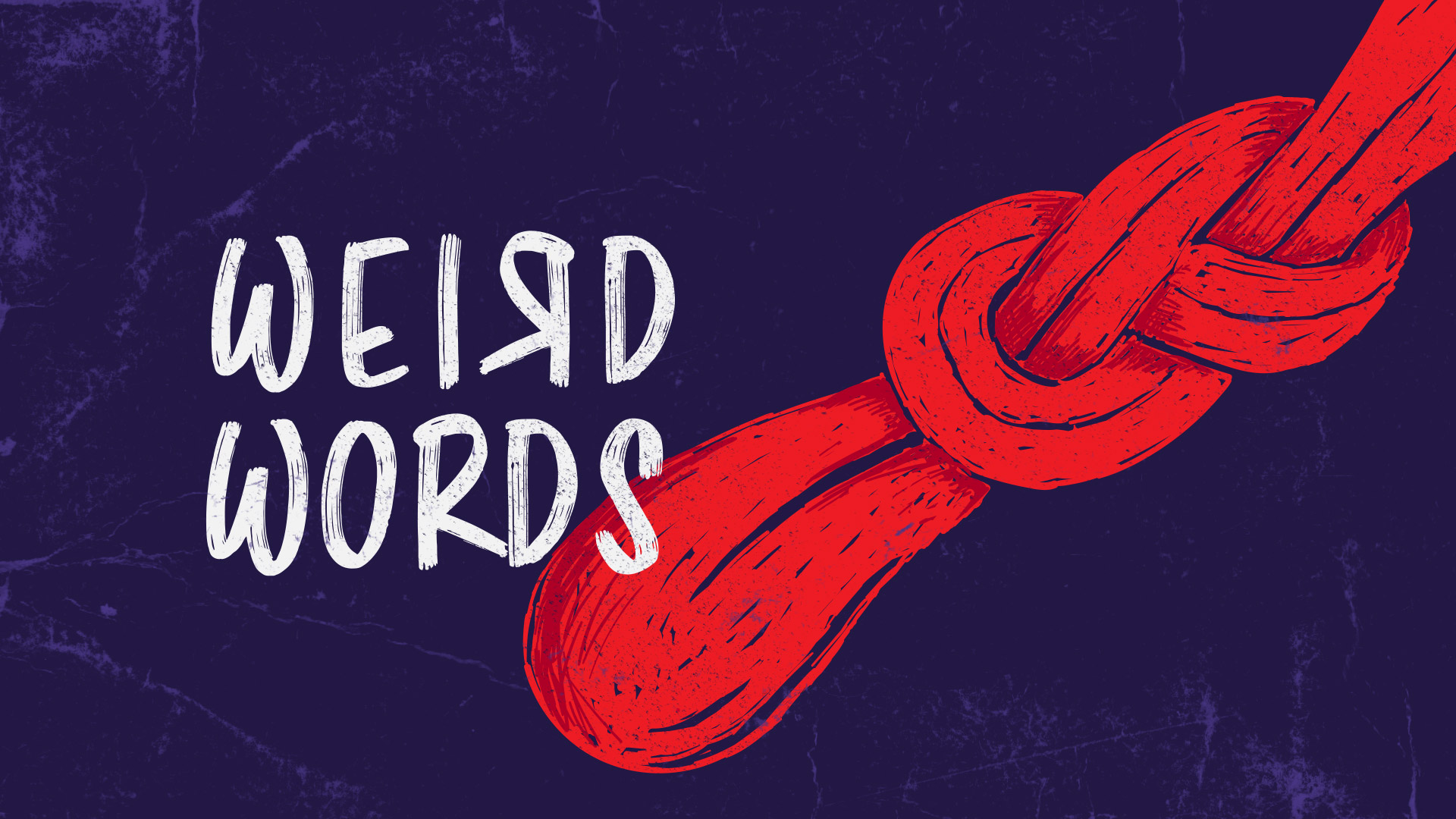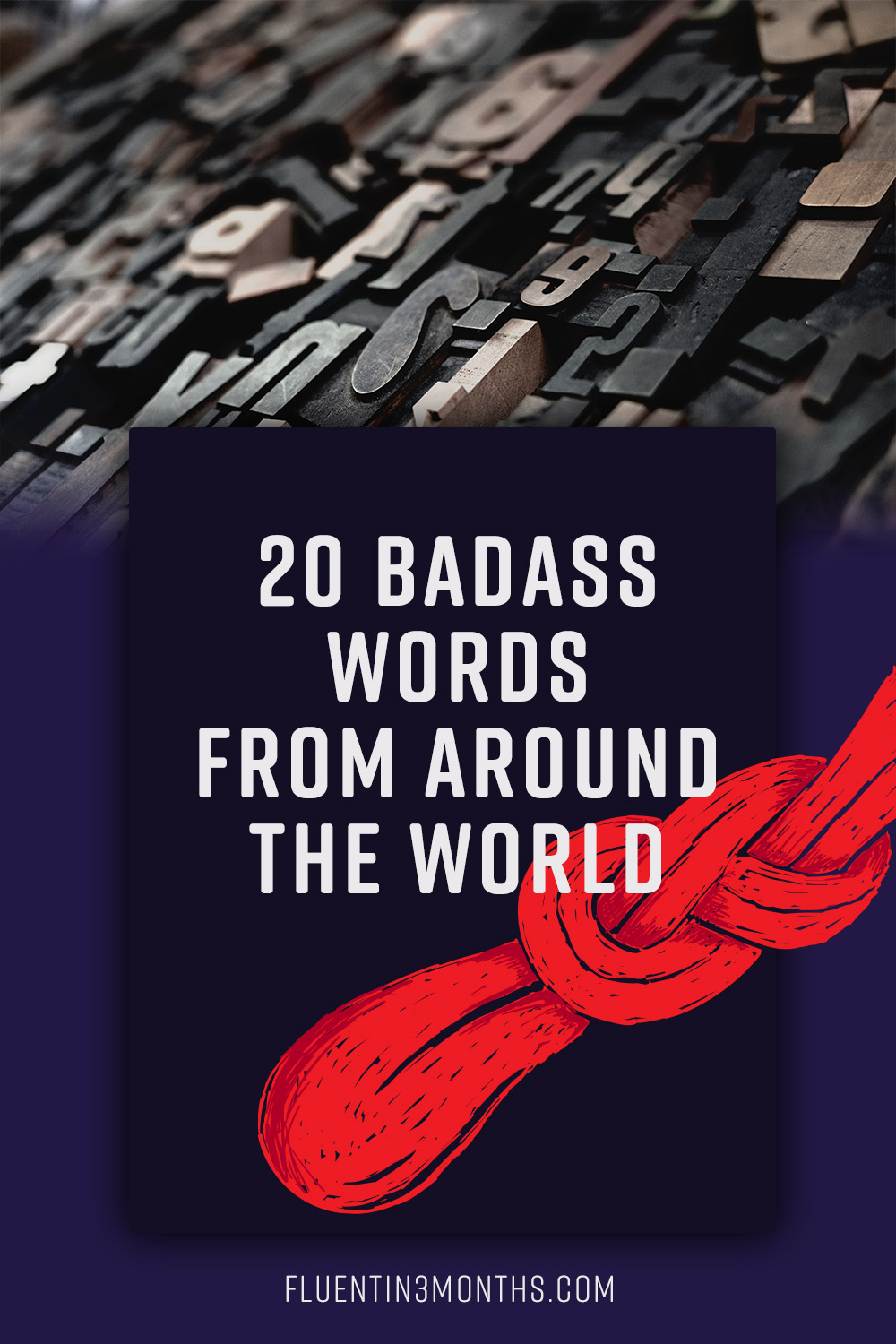20 Weird Words From Around the World
I’ve always loved weird words. They’re a fun thing to look forward to when learning a new language.
I decided to share some of the most badass words from around the world with you today.
You’re in the right place if you want to learn some international:
- cool-sounding words – like chutzpah in Yiddish
- strange words – like tartle in Scottish
- funny words – like fifone in Italian
- silly words – like ohrwum in German
- crazy words – like frappadingue in French
Here’s a truth about languages: no two languages have the exact same type of vocabulary.
A language is shaped by the local geography, by the people’s experience and their culture. For that reason, each language has its own idioms and special words.
Some foreign ones are untranslatable in English. Some you would never think of as necessary words. Some are plain bonkers.
Here, I give you 20 of the weirdest words from all over the world. Starting with a weird English word you’ve likely never heard of:
1. Arachibutyrophobia: One of the Weird English Words You’d Never Know About
Fellow fearful people, you might see where this one is going. If you are afraid of spiders, you have “arachnophobia”. If you are afraid of the sea, you have “thalassophobia”.
You’ve got it, “phobia” means “fear”. So what does “arachibutyro” mean, then?
If you’ve got arachibutyrophobia, you are… Afraid of peanut butter. In Greek, arachi means “ground nut”, butyr stands for “butter”, and phobia is “fear”.
More specifically, arachibutyrophobia is the fear of having peanut butter stick to the roof of your mouth. For some people, the sensation is too close to one of choking to be bearable.
2. Frappadingue: The Weird French Word to Describe Your Crazy Friend
We all have that one crazy friend. The French have a word to describe just how over-crazy this friend is.
A frappadingue is a very crazy person in French.
The word is made up of two other words that mean “crazy”: frappé (literally “hit” as an adjective) and dingue.
In France, your friend would be a “hit crazy”.
Keep in mind that frappadingue, frappé, and dingue are all familiar words. And they’re not terribly popular anymore.
3. Tartle: A Scottish Word That We All Experience
Imagine this: you’re walking down the street, absorbed in your own thoughts. Suddenly, someone stops you and greets you by using your name. You smile, act all friendly, and are about to greet them back… But for a second, you’ve forgotten their name.
Black hole. Nothing.
If that’s something that often happens to you, you’re in luck.
No, I don’t have a cure for it. But the Scottish have the next best thing: a word for it!
In Scottish, tartle encapsulates the moment of hesitation you face when you’ve forgotten someone or something’s name.
It doesn’t go beyond that. It just describes that awkward few seconds, not the act of totally forgetting about a name.
4. Chutzpah: An Interesting Yiddish Word That We Use in English
Chutzpah, pronounced as “hootspah”, derives from the Yiddish word ḥuṣpāh (חֻצְפָּה). Its meaning is close to “insolence” and “audacity”.
Chutzpah is usually used as a mark of admiration. It sometimes carries a tinge of disapproval as in you wouldn’t approve of how audacious a person has been, but you still recognize it took courage.
5. Fifone: One of the Cool-Sounding Words in Italian that Don’t Mean What You Think
Unfortunately, fifone doesn’t mean “big FIFA fan” in Italian.
I know, the world really needs a word for that. But it’s not this one.
The word fifone comes from “fifa”, a colloquial term for “fear”. For this reason, a fifone is a “scaredy cat”.
6. Ohrwurm: If You Love Super Specific German Words, This One's for You
In German, ohrwum is used to describe the song that you can’t stop humming.
You know the one that got into your head and now won’t leave? The one you hum under the shower or while you’re trying to focus on an important paper? That one.
And for Germans, this phenomenon is an “ear worm”. That’s exactly what ohrwum means.
7. Mokita: The Kivila Word That English Really Needs
Kivila is one of the over 820 languages spoken in Papua New Guinea. If that doesn't make it impressive enough in your eyes, maybe this Kivila word will.
Mokita refers to that truth everyone knows but implicitly agrees not to talk about. Somehow like not addressing the elephant in the room, or not discussing the gym guy’s hair implants.
They’re not a miraculous side effect of his new exercise routine.
8. Quijotesco/a: One of the Silly Words in Spanish that Will Make You Smile
As weird as it seems, the adjective quijotesco, quijotesca if feminine, has an English equivalent: “quixotic”.
For those who hadn’t heard about it before, and I know I can’t be the only one, “quixotic” refers to someone or something very idealistic and impractical.
If you’ve recognized the character after which the word was created, then you know why.
Don Quixote de la Mancha was written by Spanish author Miguel de Cervantes. He is the one who fought the windmills thinking they were giants. He went to extreme lengths to defend what he believed in and passed for crazy.
He really was one specimen of his own.
9. Jayus: The Indonesian Word For Bad Jokes
We all know someone who always has a jayus at hand.
Jayus is an Indonesian slang word for a “joke that is so not funny that you can’t help but laugh”. Generally, what would make you laugh is the chutzpah of whoever told the joke.
Think if dad jokes reached that level. Unfortunately, most of the time they hover in between the laughing stage and stay painfully unfunny.
10. Irusu: The Best Japanese Word for Introverts
The Japanese word irusu refers to the act of pretending no one is home when someone knocks at the door.
English really needs this word!
11. Iktsuarpok: An Oddly Romantic Inuit Word
This word could live rent-free in my mind only because of its meaning.
Iktsuarpok is an Inuktitut word with a very specific meaning. It’s the feeling of anxiousness and excitement that makes us look out the window for the person we’re expecting to arrive shortly.
Do you think pets experience this one?
12. Mamihlapinatapei: A Profound Yaghan Word
The Yaghans live in the Tierra del Fuego region in South America.
Mamihlapinatapei is a special word from the Yaghan language that refers to a meaningful look held by two people who would like to make an advance but fear being rejected.
In English slang, we could describe it as “pining after someone”.
13. Kummerspeck: The Perfect German Word to Explain the Aftermath of Emotional Overeating
Meet Germany’s “grief bacon”, the kummerspeck.
Kummerspeck isn’t a food but rather the weight that you put on because of a certain type of food.
It comes from emotional binging.
Next time you nervously try to sink your sadness, stress, or anger with chocolate, ice cream, or chips… You’ll be able to properly worry about the extra pounds you’ll gain.
14. Tingo: A Relatable Pascuense Word
The word tingo comes from Easter Island. It’s the act of borrowing one thing at a time from a friend’s house until they are left with… Nothing.
It’s what happened to me at school. I started every year with a properly filled pencil case: rubber, pencil, pens. By the end of the year, I was lucky to still have the pencil case. Meanwhile, my friends had miraculously doubled their stationary.
15. Ya’aburnee: One of the Most Interesting Obscure Words You’ll Learn
This Arabic word carries sadness and love at the same time.
Ya’aburnee (“you bury me”) represents the wish to die before someone else because going on after their death would be unbearable.
Parents are likely to feel it towards their children.
It’s a very sad yet quite touching expression.
16. Kyōiku mama: A Japanese Word Deeply Rooted in the Japanese Culture
In Japanese, a kyōiku mama is a mother who forces her children to work towards academic achievement with excessive obsession. The term kyōiku mama literally translates to “education mother”.
A kyōiku mama is a stereotypical character in Japan, a country already known for its regard for discipline. This type of mother usually ignores her children’s wellbeing in favour of their academic performance.
17. Yaourter: One of Those Strange Words in French
Would you believe it if I told you that French people sing yoghurt?
In French, when people try speaking or singing in a foreign language and end up using incomprehensible mishmashes of syllables, you would say that they “yoghurt”.
When used this way, yaourt is close to “gibberish”.
It gets more interesting when you learn that the expression has its own verb: yaourter (“to yoghurt”).
Keep in mind that the verb isn’t used as much as the noun.
18. Backpfeifengesicht: The Perfect Slapping Word
Too many German words in this list? Germans are just too good at making up weird words.
Backpfeifengesicht literally translates to “a face in need of a punch” in English.
What else could I add to that? It’s a brilliant way to describe someone who is or looks insolent or irritating.
French has a rough equivalent to this term. It’s tête à claques (“nuisance”, literally “head slaps”)
19. Akihi: One of the Funniest Hawai’ian Words
Akihi is the act of receiving instructions only to forget them as soon as you try to put them into practice.
Once again, a word that leaves a serious gap in the English language. We need it!
20. Toodle Pip: How to Say Goodbye in English With Very Weird Words
If you’re not from the United Kingdom, you might not be familiar with this expression. It comes from the 20th century and means goodbye in a humorous way. Another form of it is “Toodle-oo”.
There are several explanations for the word, but two stand out. The first is that toodle imitates the noise of a horn, used to announce a departure in the 1900s. The second is that it comes from the French à tout à l’heure (“see you later”).
Toodle Pip, Then!
A ridiculous goodbye is exactly what we need to wrap up this article It’s time for iktsuarpok until the next post.
Now that you know all these strange and interesting words from around the world, why not learn something else?
(Psst… We have an epic list of dirty words!)
Combine words from both posts and make your own list!




Social